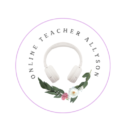How much will I earn?
Earnings are relative and will vary from person to person. Some things that affect earnings are:
- Platform vs freelance
- Platforms will typically set your pay per class or per minute.
- Some platforms will allow you to name your own price per class (Outschool), but may take a percentage for overhead fees
- 100% freelance are completely in charge of their fees, but will have to market themselves.
- Hours spent teaching per week
- How “booked” you are
When I worked for an ESL platform that marketed to children, I was able to earn enough to make 2 minimum payments on my student loans, and still had some left over! I typically worked 2-3 hours a day and was booked for 90%-100% of my available classes.
Can I do this while home with my child(ren)?
Yes! I have been doing this with my son at home since 2019. Different families have different ways of working their schedule around their time with their children. Some teachers:
- Work early in the morning before their kiddos wake up
- Work during nap time
- Hire a baby sitter for a couple hours a day
- Have different independent activities planned for their kids
- Work when their spouse/partner/family is available to help care for the kid(s)
What works for you won’t work for another teacher, and vice versa! Deciding when and how you will schedule this is part of getting started as an online teacher. The best part – you can change it up if it’s not working for you!
Do I have to be tech savvy to teach online? What tech requirements are needed?
Not at all! I let this misconception and fear hold me back from getting started online for over two years. The truth is, you probably already have everything you need to get started. The basics needed are:
- Decent internet connection
- Laptop/desktop
- Webcam
- Headset with mic (not required but highly recommended)
That’s it! As you’re researching, you’ll probably hear of all sorts of extra gadgets (green screen, document camera, generator, standing desk) but these aren’t needed to get started, or at all. As you get more comfortable in the online classroom, you will discover what you need and what in order to have an effective class, and what you can do without.
What hours are required to become an online teacher?
There isn’t a cut and dry answer for hours required. If you choose to teach on a platform, they often have requirements of how much availability they want you to have per week. Of course, this will vary from platform to platform.
If you choose to freelance, you will be completely in charge of your schedule. This means, there are no minimum hours required, you are not required to teach during a certain time of the day (like 9-5). You can teach as much or as little as you want!
There is a caveat: some platforms do not require minimum hours. Outschool, for example, allows you to set your own schedule, but you are not considered 100% freelance here. They have different rules and requirements you must follow in order to teach on the platform.
Do I need a Bachelor’s Degree?
The short answer: no
The long answer: Each platform will have different requirements for teachers. Some platforms (like ESL) usually require a Bachelor’s Degree in something. It doesn’t have to be related. Other platforms, like Outschool, don’t necessarily look for a degree, but will look for qualifications for certain subjects. These subjects are usually highly technical subjects. If you choose to freelance independently – you don’t need one! Since you run your own business here, the only people you answer to are your clients. You can teach English without any of the certifications. You can teach the highly technical subjects without proof of knowledge or expertise. This is where research on platforms and niches come into play. I talk more about this research in the free get started guide here.
Do I need a TEFL Certification?
Let’s first start with what is a TEFL Certification? TEFL stands for Teaching English as a Foreign Language. You may also see the acronyms ESL (English as a Second Language), TESOL (Teaching English to Speakers of Other Language) and ELL (English Language Learner).
Again, the need for a TEFL Certification depends on what and where you teach. If you’re teaching English to non English speakers, most platforms will require it. If you choose to freelance independently, again it’s not needed, but will help your qualifications with potential clients.
